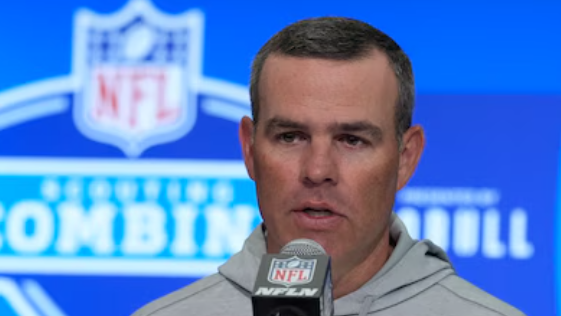Orlando — Buffalo Bills supporters were taken aback to discover that their team was awarded a fourth-round selection rather of a third when the NFL revealed the 2024 compensatory picks earlier this month.
Speaking to reporters on Sunday night from the JW Marriott in Orlando, the location of this year’s NFL annual meeting, is Bills general manager Brandon Beane. He claimed that simply receiving a fourth-round compensatory pick was a “raw deal” for his team.
Every summer, compensatory picks are decided by comparing the number of players a team lost to the number of players they added during the free agency period of the previous offseason. The amount of money that teams pay newly signed free players is then subtracted from the amount of money obtained by free agents who sign with other teams. A team may receive compensation in the form of a third-round pick if it loses more money than it paid.
Tremaine Edmunds, a top middle linebacker for the Bills, earned a new four-year contract worth over $20 million per season with the Chicago Bears last season, which allowed the Bills to lose him in free agency. The most expensive off-season acquisition for Buffalo was pass rusher Leonard Floyd, who agreed to a one-year contract for less than $10 million. Yet that agreement didn’t even factor into the comp formula because the Bills signed Floyd in June – past the deadline.
Beane had been operating under the assumption that the Bills would receive a third-round compensatory pick for the 2023 season due to how free agency played out. When the comp picks were announced, it was a disappointment as both the Bills and the San Francisco 49ers, who also expected a higher pick, were only awarded fourth-round picks. Both teams questioned the NFL about the calculations, feeling confident that they should have received a third-round pick based on the transactions during free agency. Despite the discrepancy, Beane expressed frustration at the complex calculations and adjustments that led to the lower compensatory pick.
When teams sign free agents, they sometimes use future void years to reduce salary cap hits in the first season. Beane explained how the league factors in these void years for the cap hits. He cited an example with a player from San Francisco whose average salary per year was counted higher due to void years. The Bills missed out on a third-round pick due to their final numbers. They traded their third-round pick last year for a cornerback and were banking on a compensatory pick. Beane is uncertain about next year’s compensatory picks due to fewer minimum deals this offseason. He mentioned potential changes in the compensatory formula but acknowledged it won’t help them with the lost third-round comp pick. Beane shared that the Bills have around $6-7 million in cap space and confirmed a deal with Austin Johnson, with final terms pending due to possible void years affecting the cap.
